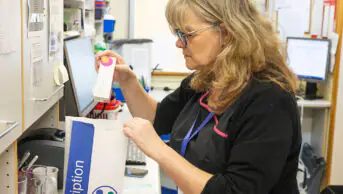
Shutterstock.com
Nearly a third of Pharmacy First consultations completed by pharmacy multiples in the first month of the service were carried out in the most deprived parts of England, according to the Company Chemists’ Association (CCA).
In January 2023, The Pharmaceutical Journal revealed that pharmacies in areas of high deprivation provide 50% more NHS services to their local populations overall.
Data from the CCA, published on 19 March 2024, show that just over 3,000 of its members’ pharmacies completed 48,195 Pharmacy First consultations between the scheme’s inception on 31 January 2024 and 3 March 2024. Members of the CCA include Boots, Rowlands, Superdrug and Pharmacy2U.
Analysis of the consultations by the CCA shows that 30% of the consultations were provided in the 20% most deprived communities, as measured by the index of multiple deprivation.
The data also show that 12% of consultations were given in the 20% least deprived communities in England.
Nearly a third (29%) of consultations were provided outside of standard business hours, which are defined as 09:00 to 18:00, Monday to Friday, while 29% of the out-of-hours consultations were given in the most deprived areas, compared with 26% in the least deprived areas.
However, an analysis by The Pharmaceutical Journal in March 2024 revealed that more than a fifth of community pharmacies have scaled back their opening hours in recent months, with fewer pharmacies open out of hours.
Pharmacy First offers patients the chance to consult a pharmacist for seven conditions: urinary tract infection, shingles, impetigo, infected insect bites, acute sore throat, acute sinusitis and acute otitis media.
The CCA’s data show that acute sore throat was the most common concern, accounting for 31% of consultations.
The second most common concern was uncomplicated urinary tract infection, at 27% of the consultations, and the third most common was acute otitis media, at 16% of consultations.
This was followed by consultations for sinusitis at 14%; impetigo at 6%; shingles at 4%; and infected insect bites at 3%.
In a statement published alongside the results, the CCA said that, with Pharmacy First, the public was demonstrating “a level of initial patient engagement not seen before” and called for the scope of the service to be expanded.
Malcolm Harrison, chief executive of the CCA, said: “[The] early signs were that Pharmacy First was delivering for patients and the NHS.
“Patients are accessing the service across the entire week, including outside of typical work hours and at weekends,” he added.
“The level and nature of uptake demonstrates the need for this service. Nearly a third of all Pharmacy First consultations delivered by our members have been in the 20% of communities with the highest levels of deprivation.
“This proves our long-held belief that NHS services commissioned nationally through the pharmacy network immediately benefit those who need access to care the most.”
The Pharmaceutical Journal found in January 2021 that pharmacies in these areas of high deprivation are more likely to close, risking their accessibility.
Commenting on the Pharmacy First data, Rachel Power, chief executive of independent charity the Patients Association, said: “We welcomed Pharmacy First when it was first announced, believing it would expand access to care and these data suggest that’s exactly what’s happened.
“We’re not surprised to see that uptake of the service has been higher in communities affected by deprivation. People living in areas affected by deprivation often have higher levels of health needs than people living in affluent areas, but often have poorer access to healthcare. This can result in patients seeking care in A&E departments, which isn’t always appropriate for them.
“Community pharmacies, however, are at the centre of most communities. They’re accessible, staff are often local themselves, and they have always been a source of great information for patients.
“Pharmacy First makes use of highly trained professionals and we look forward to further review of the service, including patient feedback, to more fully assess benefits to both patients and the NHS, and how it can be developed further.”
In February 2024, health minister Lord Markham told the House of Lords that around 3,000 Pharmacy First consultations were carried out in the first three days of the service’s operation.
1 comment
You must be logged in to post a comment.



Unfortunately my experience as a Locum Pharmacist is that pharmacy contractors decided to reduce their hourly rates at introduction of Pharmacy First. They expect Pharmacists to do more work without decent remuneration. Nothing changes